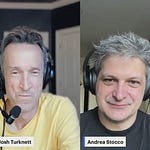In this episode, Josh fields a question from Claudia, who says,
"Does having ADHD affect one's ability to play an instrument well, specifically the five-string banjo?"
If you’d prefer to listen to the podcast, just click below. Or, if you’d prefer to continue reading, then just keep scrolling for the edited transcript of our conversation.
Josh: As some of you may know, there is some controversy in the psychiatric and neurological communities about ADHD, including whether it should be considered a disorder or more of a point along a spectrum of normal behavior. Maybe it's largely something brought about by living in environments that are quite different from the ones our brains evolved in.
For example, if you have an eight-year-old child who has trouble sitting still at a desk for several hours a day, should that be interpreted as a sign of a disordered, malfunctioning brain? Or perhaps as a normal brain deprived of the very things it needs, like movement, social interaction, and play?
The Concept of Adult ADHD Is Still Being Debated
The entire concept of adult ADHD, which really wasn't even a formal diagnostic category until about a decade ago, is also somewhat controversial. Some argue that this evolution was largely influenced by the pharmaceutical industry since the primary treatments are pharmaceutical in nature. But I'll avoid going any further down that avenue today and stay focused on the question at hand, pun entirely intended.
Attention Is Influenced by Both Genetic and Lifestyle Factors
Every brain has a certain level of distractibility, particularly in specific environments. Some of that variance in distractibility, or the ability to focus despite distractions, may be genetically influenced, impacting the networks and neurochemicals involved in attention. For those who find it hardest to maintain focus, they would meet the criteria for a diagnosis of ADHD. So, the question becomes how being at that end of the spectrum might influence one’s ability to learn to play an instrument.
First, let's discuss attentional mechanisms. While genetics can make one brain more distractible than another, that’s just one of many factors influencing attention. Lifestyle factors like diet, nutrition, sleep, and physical activity also significantly affect our ability to pay attention, even for those with ADHD. Anyone who’s gone without a good night’s sleep knows how much that affects attention.
There’s evidence that the genetic factors in ADHD make people more vulnerable to mismatches in sleep, nutrition, and activity. For example, sleep deprivation may affect those with ADHD more severely than those without. The most crucial point, though, is that our attention is modifiable and plastic. It can be improved through short-term lifestyle changes as well as long-term skill development.
Productive Practice Does NOT Require Long Attention Spans
Second, you don’t need long attention spans to have productive practice sessions. Quality beats quantity when it comes to practicing anything, including learning a musical instrument. The reason we wonder about the impact of attention, in the first place, is because attention is necessary to trigger neuroplasticity. One of the essential ingredients of what is referred to as deliberate practice—the kind of practice that leads to progress—is attention. Our brains only change for the things that we pay close attention to.
However, we know that it only takes about 20 minutes of focused attention, sometimes even less depending on the task, to trigger the brain changes that lead to plastic reorganization and progress. After that point, you encounter diminishing returns. There’s only so much brain change that can happen in a given interval, just like excessive muscular exertion doesn’t produce more growth and can even be counterproductive. Ultimately, focused attention for a short period is often sufficient to trigger meaningful progress.
ADHD May Offer Advantages in Acquiring Complex Skills
We can also look at empirical evidence regarding whether ADHD could be an advantage or disadvantage when it comes to acquiring complex skills. There’s evidence suggesting that ADHD may confer some advantages. For instance, research on athletes has shown that the prevalence of ADHD among elite athletes is higher than in the general population. In one study, it was about 7 to 8%, which is almost double that of the general population. Clearly, ADHD isn’t preventing people from acquiring complex skills.
Many people with ADHD experience periods of intense concentration, often referred to as hyperfocus. During these states, individuals are so engrossed in a task that they lose track of time, are highly productive, and are hard to distract. This hyperfocus can be advantageous for someone trying to develop expertise, such as learning a musical instrument. Hyperfocus tends to occur in areas where the person has high intrinsic motivation—where they are genuinely interested in the task at hand.
ADHD Can Manifest as Extreme Attentional States
It might be appropriate to think of ADHD as a state of heightened extremes or a more labile attentional system. In settings where intrinsic motivation is low, someone with ADHD may be more distractible and have difficulty concentrating. This is why people with ADHD may struggle in certain school environments where intrinsic motivation is often lacking. On the other hand, in settings where motivation is high, individuals with ADHD can be better than average at focusing, which might explain why they are often overrepresented in areas that demand high levels of skill.
Practical Recommendations for Musicians with ADHD
Lastly, I’ll conclude with a few recommendations for someone with an ADHD diagnosis interested in learning an instrument. As mentioned, there are intrinsic factors we can modify to improve our focus, such as attending to nutrition, sleep, and physical activity—all of which can enhance attention, whether or not someone has a diagnosis. These are things we’ve covered in previous episodes, and they improve overall brain health and cognition.
The other variable we can manipulate is our environment. If we want to enhance our ability to stay focused, we should remove as many potential sources of distraction as possible from our practice environment. This is especially important if attention is a challenge. By consistently practicing in a distraction-free environment, we can condition ourselves to associate that environment with focused attention. Conversely, practicing in a highly distracting setting can lead to poor attentional habits.
ADHD Is Neither an Advantage nor a Disadvantage by Itself
Ultimately, ADHD isn’t necessarily an advantage or disadvantage—it depends on how you structure your practice and minimize potential weaknesses while amplifying strengths. Interestingly, Claudia’s question was whether ADHD affects one’s ability to learn an instrument, not necessarily if it’s a disadvantage. The answer is that it can work both ways, depending on the individual and their approach.
Tommy, do you have any follow-up questions or comments?
Tommy: Yeah, I think I’d mainly ask you to dig in a little more on other factors, particularly nutrition and sleep, as they relate to ADHD. Kids, for instance, tend to be pickier eaters, and sleep challenges, like high sleep latency, are common. How would you approach these challenges to support attention and focus?
Josh: Good question. For picky eaters, I’d say the most important thing is to limit access to foods with added sugars. For a picky eater, just knowing sugary foods are available makes them hard to resist. Instead, focus on finding whole foods that they enjoy, even if it’s the same thing repeatedly. Removing ultra-processed foods and finding healthier options can make a significant difference.
As for sleep, it’s crucial for everyone, especially those with ADHD. Many of the treatments for ADHD, like stimulants, can disrupt sleep, which over time can weaken our attentional systems. Developing good sleep hygiene and understanding which lifestyle factors move the needle the most for each person is essential. Sleep is a significant lever to pull for improving attention and focus.
Leveraging Strengths Rather Than Viewing ADHD as a Fixed Condition
Tommy: My main takeaway is that ADHD involves sliding scales of attentional capacity, and everyone is on a different part of that spectrum. None of it is inherently good or bad—it’s about understanding how to leverage your abilities to succeed at the things you care about. It reminds me of Tom Stoltman, a multi-time World's Strongest Man with autism, who sees his condition as a superpower because it allows him to hyperfocus on his training. Likewise, ADHD can be seen as a characteristic to manage and leverage rather than a fixed disorder.
Thanks for that question, Claudia. If anyone else has questions related to this topic or anything else about brain health and fitness, send them our way at brainjo.academy/questions.












